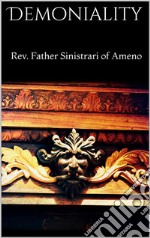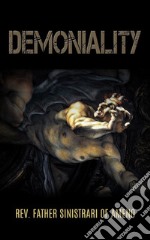Rev Father Sinistrari Of Ameno eBooks
eBooks di Rev Father Sinistrari Of Ameno
Demoniality. E-book. Formato EPUB Rev. Father Sinistrari Of Ameno - Pubme, 2017 -
The foregoing advertisement was composed at the printer’s, and ready for the press, when, strolling on the quays2, I met by chance with a copy of the Index librorum prohibitorum. I mechanically opened it, and the first thing that struck my eyes was the following article: De Ameno Ludovicus Maria. Vide Sinistrari. My heart throbbed fast, I must confess. Was I at last on the trace of my author? Was it Demoniality that I was about to see nailed to the pillory of the Index? I flew to the last pages of the formidable volume, and read: Sinistrari (Ludovicus Maria) de Ameno, De Delictis et Pœnis Tractatus absolutissimus. Donec corrigatur. Decret. 4 Martii 1709. Correctus autem juxta editionem Romanam anni 1753 permittitur. It was indeed he. The real name of the Father of Ameno was Sinistrari, and I was in possession of the title of one at least of those “serious works” which Brunet the bibliographer alluded to. The very title, De Delictis et Pœnis, was not unconnected with that of my manuscript, and I had reason to presume that Demoniality was one of the offenses inquired into, and decided upon, by Father Sinistrari; in other words, that manuscript, to all appearances inedited, was perhaps published in the extensive work revealed to me; perhaps even was it to that monography of Demoniality that the Tractatus de Delictis et Pœnis owed its condemnation by the Congregation of the Index. All those points required looking into.
Demoniality or Incubi and Succubi. E-book. Formato EPUB Rev. Father Sinistrari Of Ameno - Anna Ruggieri, 2017 -
Father Ludovico Maria Sinistrari, of the Order of Reformed Minors of the strict Observance of St. Francis, was born in Ameno, a small town of the district of St. Julius, in the diocese of Novara, on the 26th of February 1622. He received a liberal education and went through a course of humanities in Pavia, where, in the year 1647, he entered the Order of Franciscans. Devoting himself henceforward to tuition, he was first a professor of Philosophy; he then, during fifteen successive years, taught Theology in the same town, amidst a numerous concourse of students attracted from all parts of Europe by his high repute. His sermons preached in the principal cities of Italy, at the same time as they caused his eloquence to be admired, were productive of the happiest results for piety. Equally endeared to the World and to Religion, he had been favoured by nature with the most brilliant gifts: square frame, high stature, open countenance, broad forehead, sparkling eyes, high-coloured complexion, pleasant conversation replete with sallies of wit; more valuable still, he was in possession of the gifts of grace, through which he was enabled to sustain, with unconquerable resignation, the assaults of an arthritical disease he was subject to; he was, moreover, remarkable for his meekness, candour and absolute submission to the rules of his Order. A man of all sciences, he had learnt foreign languages without any master, and often, in the general Meetings of his Order, held in Rome, he supported, in public, theses de omni scibili. He, however, addicted himself more particularly to the study of Civil and Canon laws. In Rome he filled the appointment of Consulter to the supreme Tribunal of the Holy-Inquisition; was some time Vicar general of the Archbishop of Avignon, and then Theologian attached to the Archbishop of Milan. In the year 1688, charged by the general Meeting of Franciscans with the compilation of the statutes of the Order, he performed this task in his treatise entitled Practica criminalis Minorum illustrata. He died in the year of our Lord 1701, on the 6th of March, at the age of seventy-nine.

